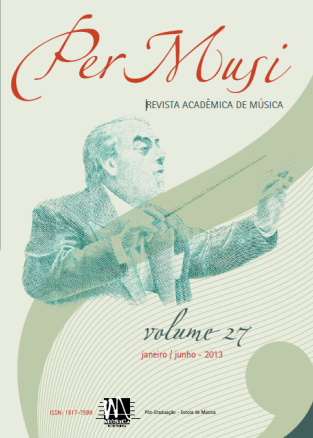Expressividade na opinião de cantores líricos
Palavras-chave:
Expressividade no canto e na atuação, Canto em óperaResumo
Investigação sobre a opinião de cantores líricos em relação à expressividade na performance operística. Método: 50 cantores líricos (24 mulheres e 26 homens) citaram cinco palavras relacionadas à expressividade do cantor de ópera. Resultados: a partir da frequência das repetições de palavras nas respostas dos cantores foram elaborados seis eixos temáticos: emoção (76%); técnica (64%); habilidades (58%); entrega (54%); corpo (48%) e interpretação (38%) que foram correlacionados aos dados de caracterização dos sujeitos.
Referências
ABDO, Sandra N. Sobre o problema da autonomia da arte e suas implicações hermenêuticas e ontológicas. Kriterion [online], 2005, v. 46, n.112, p.357-366.
ANDRADA E SILVA, Marta A. Expressividade no canto. In: KYRILLOS Leny R., organizadora. Expressividade: da teoria à prática. São Paulo: Revinter, 2005, p.91-103.
CAVAZOTTI, André. Caminhos para pesquisa na área de performance musical: uma breve introdução à fenomenologia da música. Cadernos do Instituto de Artes da UNICAMP, Campinas, 2001, v.5, p.35-38.
COSTA, Patrícia. A expressão cênica como elemento facilitador da performance no coro juvenil. Per Musi, 2009, n.19, p.63-71.
GABRIELSSON Alf, JUSLIN Patrick N. Emotional Expression in Music Performance: Between the Performer’s Intention and the Listener’s Experience. Psychology of Music, 1996, n.24, p.68-91,
HIGUCHI Marcia K.K. Fidelidade ao texto e a expressividade na interpretação musical: uma visão neuropsicológica. Anais do SIMCAM4 - IV Simpósio de Cognição e Artes Musicais, 2008. Disponível em: http://www.fflch.usp.br/dl/simcam4/downloads_anais/SIMCAM4_Marcia_Higuchi.pdf
HIGUCHI, Marcia K.K, LEITE João P. Rigidez métrica e expressividade na interpretação musical: uma teoria neuropsicológica. Opus: Rev. da Associação Nacional de pesquisa e pós-graduação em música – ANPPOM (Goiânia), 2007, n.13, v.2, p.187-207. Disponível em: <http://www.anppom.com.br/opus/opus13/212/12-Higuchi-Leite.htm
MELLO, E. L.; FERREIRA, L. P.; PACHECO, N. F.; SILVA, M. A. A. Expressividade na opinião de cantores líricos. Per Musi, Belo Horizonte, n.27, 2013, p.152-158
LOUREIRO, Mauricio A. A pesquisa empírica em expressividade musical: métodos e modelos de representação e extração de informação de conteúdo expressivo musical. Rev. Opus, 2006, n.12, v.12, p.1-26. Disponível em: http://www. anppom.com.br/opus/opus12/01_Mauricio.pdf
MAULÉON Claudia, MARTINEZ Isabel C. Co-articulacion em el canto: uma clave para analisis del discurso expressivo. Anais IV Reunion de SACCoM, 2004. Disponível em: http://www.saccom.org.ar/2004_reunion4/actas_indice.htm
MINAYO, Maria Cecília de S. O desafio do conhecimento: pesquisa qualitativa em saúde. 8º Ed. São Paulo: Hucitec. (2004).
MUSZKAT Mauro, CORREIA Cléo MF, CAMPOS Sandra M. Música e Neurociências. Rev. Neurociências, 2000, n. 8, v.2, p.70-75.
PAREYSON Luigi. Os problemas da estética. 3ª ed. São Paulo: Martins Fontes, 1997, 246p.
PAULA L, Lucia; BORGES Maria Helena J. O ensino da performance musical: uma abordagem teórica sobre o desenvolvimento dos eventos mentais relacionados às ações e emoções presentes no fazer musical. Música Hodie, 2004, n.4, v.1.p.29-44.
SCHENKER Heinrich. The Art of Performance. New York: Oxford University Press; 2000.
SALGADO Antônio G. A expressividade na face e na voz do cantor e sua importância na comunicação do conteúdo emotivo de uma performance musical. Performance – Revista de Interpretação Musical, 2006, n.2, p.1-13. Disponível em: <http://www.performanceonline.org/pt/edicoes/pt/n2/SalgadoPrt.pdf^>
______. Contributo para a Compreensão de Alguns dos Processos Perceptivos e Cognitivos Implicados no Reconhecimento da Expressão da Emoção Facial e Vocal no Canto. In: Actas della Primera Reunión Anual de SACCoM. Avellaneda: Ed. Flavio Shifres, 2001. Disponível em: <http://www.saccom.org.ar/secciones/primera/Papers/Salgado/Salgado.htm
SAPOLSKY Robert. Assumindo o controle do estresse. Rev. Scientific American Brasil, 2003, n.17, v.1, p.79-87.
SHIFRES Flavio. El ejecutante como intérprete: un estudio acerca de la cooperación interpretativa del ejecutante en la obra musical In: Actas della Primera Reunión Anual de SACCoM. Ed. Flavio Shifres. Avellaneda. Universidad de Buenos Aires, 2001. Disponível: http://www.saccom.org.ar/secciones/primera/Papers/Shifres/Shifres.htm
Downloads
Publicado
Edição
Seção
Licença

Este trabalho está licenciado sob uma licença Creative Commons Attribution 4.0 International License.

Exceto onde está indicado, o conteúdo neste site está sob uma Licença Creative Commons - Atribuição 4.0 Internacional.












